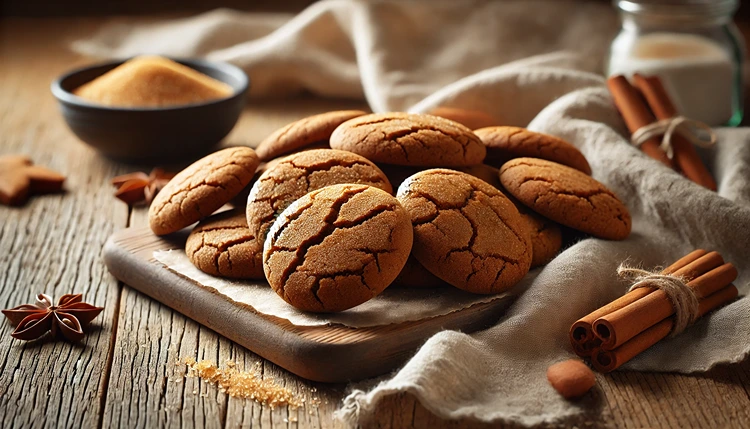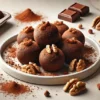Who doesn’t love the warm, spiced aroma of gingerbread cookies baking in the oven? It’s one of those timeless holiday traditions that never fails to bring joy. But if you’re vegan, you might think that chewy, perfectly spiced gingerbread cookies are a thing of the past. Not anymore! In this post, we’ll explore how to make chewy vegan gingerbread cookies with molasses that are not only dairy- and egg-free but also delicious enough to rival any traditional recipe. Whether you’re new to vegan baking or a seasoned pro, these cookies are sure to become a favorite for the holidays—or any time you’re craving a cozy treat.
With rich molasses, a kick of ginger, and a soft, chewy texture, these cookies tick all the boxes. Plus, we’re keeping things simple, so you can whip them up even if you’re short on time. Sound good? Let’s get baking!
What Makes Gingerbread Cookies Chewy?
If you’re aiming for a chewy cookie instead of a crunchy one, it all comes down to the ingredients and technique. In our vegan gingerbread cookies with molasses, the star ingredients that help create that perfect chewy texture are molasses and coconut oil. Molasses not only gives gingerbread its distinctive dark color and deep flavor but also adds moisture, which is key to a chewy cookie. Coconut oil replaces the traditional butter, bringing a richness that doesn’t harden the cookies as they cool. It’s a perfect combo for anyone craving soft, chewy cookies that stay that way.
Another trick is to make sure you don’t overbake the cookies. When they come out of the oven, they should look just a little underdone. Trust me—they’ll firm up as they cool, leaving you with a perfectly chewy texture every time.
Helpful Hint:
If you prefer even softer cookies, try refrigerating the dough for 30 minutes before baking. This helps the cookies retain more moisture during baking, leading to a chewier texture.
Key Ingredients for Vegan Gingerbread Cookies
Let’s take a look at the key ingredients in these chewy vegan gingerbread cookies with molasses. Each one plays a crucial role in creating that perfect flavor and texture:
- Molasses: This thick, syrupy sweetener gives gingerbread its signature flavor. Choose unsulphured molasses for the best taste.
- Coconut oil: A great plant-based substitute for butter. It adds richness and helps keep the cookies soft and chewy.
- Coconut sugar: A more natural, less refined sweetener that pairs well with the flavors of molasses and ginger.
- Flour: Standard all-purpose flour works here, but feel free to swap it for a gluten-free blend if needed.
- Ground spices: Ginger, cinnamon, and cloves are the holy trinity of gingerbread spices. Don’t skimp on these for that classic holiday warmth.
- Plant-based milk: Just a splash of almond or soy milk helps bring the dough together without any need for eggs.
Helpful Hint:
Can’t find coconut sugar? You can substitute brown sugar in equal amounts. While it will slightly change the flavor, it still works beautifully in these cookies.
How to Make Chewy Vegan Gingerbread Cookies with Molasses
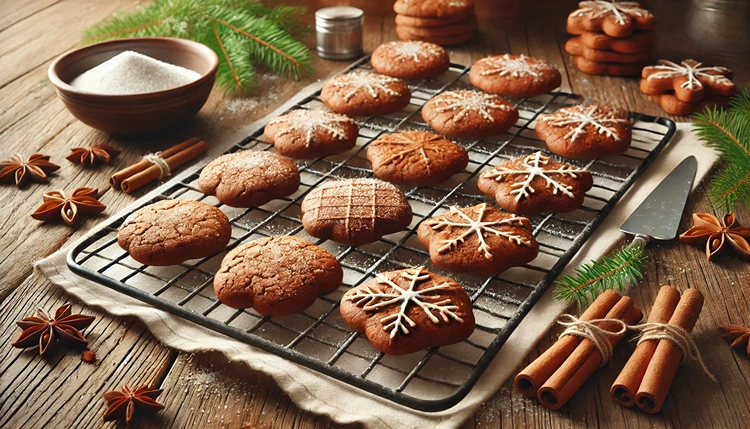
Ready to get baking? Here’s a step-by-step guide to making these cookies that are sure to impress everyone, vegan or not.
Chewy Vegan Gingerbread Cookies with Molasses
Ingredients
- 2 cups all-purpose flour
- 1/2 cup coconut sugar
- 1/2 cup molasses
- 1/3 cup coconut oil, melted
- 2 tsp ground ginger
- 1 tsp ground cinnamon
- 1/4 tsp ground cloves
- 1/2 tsp baking soda
- 1/4 tsp salt
- 2 tbsp plant-based milk (such as almond or soy)
Instructions
- Preheat your oven to 350°F (175°C) and line a baking sheet with parchment paper.
- In a large bowl, whisk together the flour, baking soda, salt, and spices.
- In another bowl, mix the melted coconut oil, coconut sugar, molasses, and plant-based milk until well combined.
- Gradually add the dry ingredients to the wet ingredients, stirring until a dough forms.
- Roll the dough into small balls (about 1 tablespoon each) and place them on the prepared baking sheet.
- Press each dough ball down slightly to flatten.
- Bake for 8-10 minutes. The cookies should look soft and slightly underbaked when you take them out.
- Allow the cookies to cool on the baking sheet for a few minutes before transferring them to a wire rack to cool completely.
Nutritional Information
- Calories: 120 per cookie
- Protein: 1g
- Fat: 5g
- Carbohydrates: 19g
- Sugar: 10g
Can I Make These Gingerbread Cookies Gluten-Free?
Yes, you can absolutely make vegan gingerbread cookies with molasses gluten-free! Just swap the all-purpose flour for a gluten-free flour blend that’s meant for baking. Make sure the blend contains xanthan gum or another binder to help the cookies hold their shape. Gluten-free baking can sometimes result in crumbly cookies, but with the right flour blend, you’ll still get that chewy, soft texture we all love.
One thing to keep in mind when baking gluten-free is that the dough may need a bit more moisture, so don’t hesitate to add an extra splash of plant-based milk if the dough seems too dry. Happy gluten-free baking!
Tips for Rolling and Shaping Vegan Gingerbread Cookies
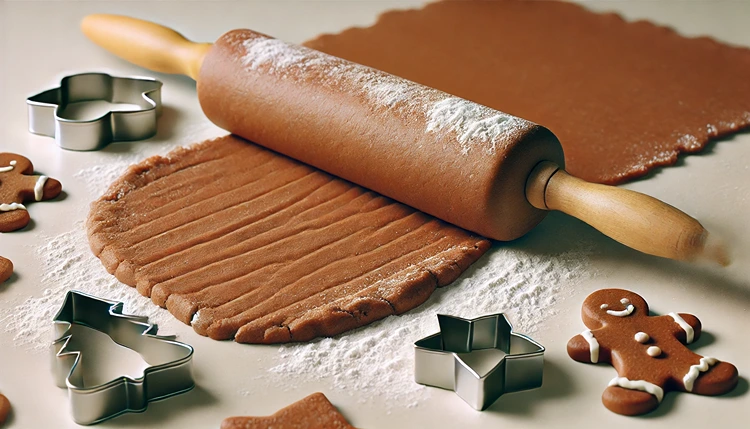
When it comes to shaping chewy vegan gingerbread cookies with molasses, you have a few options depending on how you like your cookies to look. Some people prefer a classic round, slightly domed cookie, while others enjoy rolling them out for cute gingerbread shapes. Here’s how you can easily shape and style your cookies to your liking:
Classic Round Cookies
For the classic round cookies, simply scoop out about a tablespoon of dough and roll it between your palms to form a ball. Then, place the dough ball on your prepared baking sheet and lightly press down with your fingers or the back of a spoon. This step helps ensure the cookies bake evenly and get that nice, chewy center.
Cut-Out Gingerbread Shapes
If you want to get a little more festive, roll out the dough and use cookie cutters to make fun gingerbread shapes. The key to success with cut-out cookies is chilling the dough first, which makes it easier to roll and cut. After chilling, lightly flour your surface and rolling pin, and roll the dough to about 1/4 inch thick. Use your favorite cookie cutters (think gingerbread men, stars, or holiday trees) and gently transfer the shapes to your baking sheet.
Rolling in Sugar for Extra Sparkle
If you want to add a little extra holiday sparkle, roll the dough balls in some coconut sugar before baking. This gives the cookies a beautiful, lightly caramelized finish, and adds just a touch of crunch to contrast with the soft, chewy interior. Plus, it looks extra festive!
Helpful Hint:
Storage Tips for Gingerbread Cookies
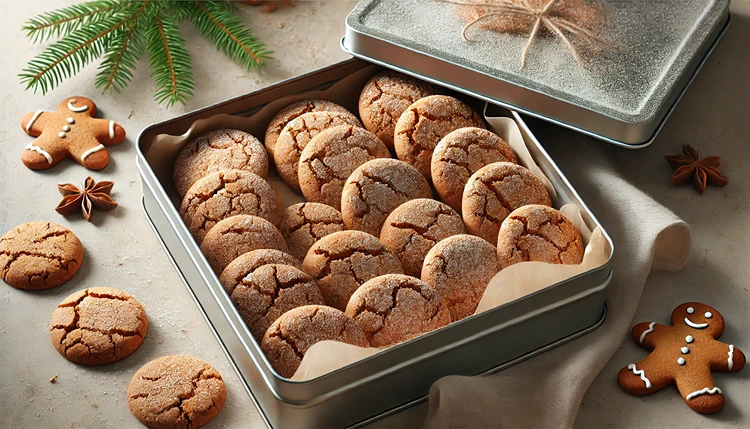
To keep your vegan gingerbread cookies fresh and chewy for as long as possible, store them in an airtight container at room temperature. They’ll stay fresh for about 5 days, though they rarely last that long in my house! If you want to keep them for longer, you can freeze the baked cookies for up to 3 months. Just make sure they’re completely cooled before freezing, and layer parchment paper between them to prevent sticking.
If you’re freezing the dough instead, simply roll it into balls and place them on a tray in the freezer. Once frozen, transfer the dough balls to a freezer-safe bag. This way, you can bake them fresh whenever the gingerbread craving strikes!
Why Molasses is Essential in Vegan Gingerbread Cookies
Molasses is truly the key ingredient in these chewy vegan gingerbread cookies. Without it, you wouldn’t get that deep, rich flavor that makes gingerbread so distinct. But what exactly is molasses, and why does it work so well in vegan baking?
Molasses is a byproduct of the sugar-making process. It’s essentially the syrup that’s left after sugar has been refined from sugarcane or sugar beets. There are different types of molasses, but for gingerbread, you’ll want to use unsulphured molasses. It has a robust, slightly smoky flavor that balances beautifully with ginger and other warm spices.
Beyond flavor, molasses also plays a role in the texture of these cookies. Because it’s liquid and quite thick, it adds moisture, which helps keep the cookies soft and chewy. It also helps with browning, giving the cookies that gorgeous, deep color we associate with gingerbread.
Types of Molasses
- Unsulphured Molasses: This is the type most commonly used in baking. It’s less bitter than other types and has a rich, full flavor. This is the one you want for these cookies!
- Blackstrap Molasses: This is a much darker and more bitter form of molasses. While it’s high in minerals, it’s too strong for most baking recipes and would overpower the flavor of these cookies.
- Light Molasses: This is the lightest and mildest version. It has a more delicate flavor but lacks the depth and complexity of unsulphured molasses.
If you can’t find unsulphured molasses, light molasses is the next best option. Just avoid blackstrap unless you’re specifically looking for a very intense flavor.
How to Store Molasses
While molasses has a long shelf life, it’s important to store it properly to maintain its flavor and texture. Once opened, keep your molasses in a cool, dark place, like your pantry. It doesn’t need to be refrigerated but should be tightly sealed to prevent any moisture from getting in. If your molasses thickens over time, you can warm it gently in a hot water bath to bring it back to a pourable consistency.
Substitutes for Molasses in Gingerbread Cookies
If you’re in a pinch and don’t have molasses on hand, you can substitute it with other ingredients, but keep in mind the flavor will change slightly. Here are a few options:
- Maple Syrup: While much lighter in flavor, maple syrup can be used in place of molasses in equal amounts. Your cookies will have a milder taste but still turn out delicious.
- Agave Syrup: Another vegan-friendly option, agave syrup is sweeter than molasses, so you may want to slightly reduce the sugar in the recipe if using it as a substitute.
- Brown Sugar: In a real pinch, you can replace molasses with brown sugar by using about 1/4 cup of brown sugar plus 1-2 tablespoons of water for every 1/2 cup of molasses.
While these substitutes can work in a bind, nothing quite beats the depth and richness of molasses in gingerbread cookies, so it’s worth picking some up if you can.
Molasses Substitutes for Vegan Gingerbread Cookies
| Substitute | Flavor Profile | Impact on Texture |
|---|---|---|
| Maple Syrup | Much milder, sweeter flavor | Slightly softer texture, less chewiness |
| Agave Syrup | Sweet, neutral flavor | Softer texture, less rich flavor |
| Brown Sugar | Rich, caramel-like flavor | Denser texture, but still chewy |
| Coconut Sugar + Water | Lightly caramelized, more subtle | Similar chewiness, but lighter texture |
Variations on Vegan Gingerbread Cookies
One of the best things about chewy vegan gingerbread cookies is how easy they are to customize. Here are a few fun variations you can try:
Add Chocolate Chips
For a bit of extra indulgence, mix some vegan chocolate chips into the dough before baking. The combination of dark, bittersweet chocolate and warm gingerbread spices is a match made in heaven. It’s perfect if you’re craving something a little more decadent!
Spice it Up
Want an extra spicy kick? Increase the amount of ginger or add a pinch of cayenne pepper to the dough. This adds a little heat that pairs surprisingly well with the molasses and cinnamon, making the cookies even more unique.
Glaze or Icing
If you’re feeling fancy, whip up a simple glaze or icing to drizzle over your cookies. A mix of powdered sugar and a tiny bit of plant-based milk makes for a quick and easy icing. You can even add a dash of vanilla or a pinch of cinnamon for extra flavor. It’s a great way to dress up your cookies if you’re serving them at a holiday party or giving them as gifts.
Helpful Hint:
If you’re using a glaze or icing, wait until the cookies are completely cooled before drizzling. Otherwise, the icing will melt and get absorbed into the cookie, losing its decorative touch.
Why These Vegan Gingerbread Cookies are Great for Gifting
If you’re looking for the perfect homemade holiday gift, look no further than chewy vegan gingerbread cookies with molasses. Not only do they taste amazing, but they also keep well and are easy to package. Stack a few cookies in a cute jar or tin, tie it with a ribbon, and you’ve got a thoughtful, homemade gift that anyone would be happy to receive.
Because gingerbread has a naturally long shelf life, these cookies stay fresh longer than other baked goods, making them ideal for shipping or giving as gifts. And since they’re vegan, they’re a safe bet for friends and family with dietary restrictions, so no one has to miss out on the fun of holiday cookies!
FAQs
Wrapping Up
Chewy vegan gingerbread cookies with molasses are the ultimate holiday treat, perfect for anyone who loves rich, spiced flavors and a soft texture. With simple ingredients like coconut oil, molasses, and ginger, you can easily whip up these cookies for family gatherings, gift-giving, or just to enjoy with a cup of tea. The best part? These cookies are fully plant-based and can even be made gluten-free, making them accessible to a wide range of diets.

